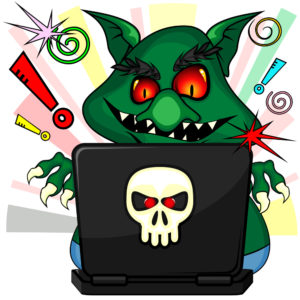
There have been a LOT of stories in the news about Facebook Memorials being desecrated by so called “Trolls” lately. Horrible stories about young suicide victims and other young recently deceased where either their existing Facebook profiles, or Pages set up to memorialise them have had really abusive cruel posts added to them. In fact one “Troll” has been charged and sentenced to 18 weeks jail for his offensive posts on many of these Pages. “Trolling” is not in it’s self a criminal act, especially when you consider the wide range of severity. But harassment, stalking, posting offensive material and online cyber abuse can be.
What is Trolling?

Follow Me on Twitter! Click here ? @_LeonieGSmith
The word Troll, I think may even be misused slightly in some of these cases. Trolling or being a troll, goes right back to the early 90’s on Usenet forums. It is generally known as a person who will post an inflammatory comment or opinion online usually in a forum, or in comments just to get up everyone’s nose, or to “bait” someone. It can be anything from mildly annoying and attention seeking, to absolutely outrageous and cruel.
How is it dealt with?
If an online community manager or forum moderator feels the comment or continued comments are hijacking the thread or are defamatory or “hate speech” they can remove it, but its generally up to the owner of the Page, or Forums discretion as to what they will tolerate, and some forums or blogs are much stricter than others.
Facebook: You can of course report an offensive comment or post on Facebook to Facebook, and generally they have been known to take the post or comments down fairly quickly. They are aware however that some people cyber bully by falsely reporting posts and comments, so they are careful, not to delete without just cause. To report just click the x sign next to a comment or post, and select the option to report and your reasons why.
Why do some blogs allow Trolls?
Some blogs or forums thrive on controversial comments and in some cases it can be more informative and entertaining to read the comments than the actual article! www.mamamia.com.au does this quite well. Some readers on the Mamamia blog, have even suggested that the stories that get posted there, are deliberately posted to enrage and polarise the readers so that the comments will be very reactionary, this keeps a post active and getting internet hits for as long as possible. It’s not unusual to see at least three pages of comments on some of these types of posts. This type of Blog or post that encourages ongoing comments and arguments about the posts, is not new, its been happening ever since people could comment on the web. Ongoing drama in the comments ensures the Blog or website gets lots of hits and interaction which then pushes it up the Google rankings and makes the website much more attractive for advertisers.
Is it really Trolling?
What is happening on these Facebook profiles of now deceased Teens, and memorial pages set up to commemorate people who have died, goes beyond what I understand to be Trolling. The comments can be so abusive and cruel I would say it’s more Cyber Bullying and harassment than Trolling. It’s certainly done to cause pain, to create a fuss, and to gain attention, even if (as it is in most cases) done anonymously. The “Troll” behaves in the same way as a fire bug does, gets vicarious pleasure in seeing the chaos they cause, there’s also a thrill in not being caught.
Options in setting up an online memorial:
The way young people and increasingly now older people communicate as a community is on line, and being able to express your sorrow for someone who has died or support the friends and families of the deceased is really important. But I don’t think Facebook Pages, or profiles or even some Blogs, unless the comments are screened prior are the best way to go. The moderators or Admin of these pages, want friends and supporters to be able to post freely their thoughts about the death of the person the memorial is set up for. And of course in many cases this allows abuse.
On Facebook: Facebook is the easiest way for most people to join a memorial community, but setting up a Group on Facebook rather then a Page, would be a far better way to go. With Facebook Groups you have the option to make it an open or closed group, with several moderators that can moderate the group 24/7 with powers to ban people, approve applications for group membership etc…The problem some of these memorial Pages were having was that once the admin banned the “Troll” the “Troll” would fast re-appear and post something under a different account. The benefit to that Troll was that the message they posted was often seen and distributed well before a moderator or Admin would have time to block and ban and delete the post. At least in a Group setting, the posts don’t have to be seen outside the group, they won’t be public, so the reach that the Troll has is much less. You can also arrange it so that only referred people get into the group. There are far more moderation options on Groups than Pages. Groups allow their guests to upload pictures, comment on posts, and post their memories with much more safety.
What happens when a Facebook profile account owner dies?
One very important question that some of these incidents bring up when a persons Profile…(not page) is desecrated is what happens to our Facebook accounts when we die? Who can access our account when we die, and prevent our profile being “Trolled” or used to post abuse Answer: There is a “next of kin” facility on Facebook, called the “Trusted Friend Tool”. It’s a really good idea to let as many people know about this as possible. It allows you to officially share your profile details with a “Trusted Friend” so that they may help access your account if it gets hacked….or if you are not around to access it.
Here’s where it is.
- Go to your Security Settings page (Account > Account Settings > Security)
- Click on the Trusted Friends section
- Click Choose Trusted Friends
- Scroll through your friends or search for specific friends
- Select 5 friends and confirm your choices
How to block others from posting to your profile:
- Go the Account menu at the top right corner of Facebook and choose Privacy Settings.
- Next to the How You Connect heading, click Change Settings.
- From the dropdown menu next to “Who can post on your wall?” choose Only Me.
Note: Friends can comment on posts they can see, including posts on your Wall even if you have restricted who can post to your Wall. If you want to totally block individuals from posting to your Wall – including commenting on posts from others – you’ll need to also limit them from seeing friends’ postson your Wall.
The difference between Pages and Groups:
Pages
-
Privacy: Page information and posts are public and generally available to everyone on Facebook.
-
Audience: Anyone can like a Page to become connected with it and get News Feed updates. There is no limit to how many people can like a Page.
-
Communication: Page admins can share posts under the Page’s name. Page posts appear in the News Feed of people who like the Page. Page admins can also create customized apps for their Pages and check Page Insights to track the Page’s growth and activity.
Groups
-
Privacy: In addition to an open setting, more privacy settings are available for groups. In secret and closed groups, posts are only visible to group members.
-
Audience: Group members must be approved or added by other members. When a group reaches a certain size, some features are limited. The most useful groups tend to be the ones you create with small groups of people you know.
-
Communication: In groups, members receive notifications by default when any member posts in the group. Group members can participate in chats, upload photos to shared albums, collaborate on group docs and invite members who are friends to group events.
To Create A Group:
- Go to your your home page and click Create Group in the left hand column. If you have existing groups, you may need to click More before you see this link.
- A pop-up box will appear, where you will be able to add a group name, add members and select the privacy setting for your group. Click the Create Group button when you’re finished.
- Once the group is created, you will be taken to the group’s page. To get started click at the top right of the page and select Edit Group. From here you can add a group description, set a group email address, add a group picture and manage members.
Follow Me on Twitter! Click here ? @_LeonieGSmith


[…] Problems with Trolls and Facebook Memorials and Tribute Pages […]
[…] The Problems With Trolls and Facebook Tribute and Memorial Pages […]
[…] Let’s take a step back. Trolls by definition, are NOT cyber bullies, these are two different types of internet users. Trolls are online users, not always nameless, who traditionally post online opposing views of varying intensity and language to stir things up, often on forums or in comments on blogs and now on Twitter. A Troll may not necessarily also be a cyber bully or a stalker. Trolling, as it is traditionally known, if done harmlessly can be really be a sort of devils advocate approach in a discussion and stimulate healthy debate. It’s when it crosses the line to outright harmful abuse that it can be seen as bullying or abuse and harassment. A cyber bully or online stalker is more likely to be breaking the law through abuse, harassment and threats. It maybe pedantic to distinguish between the two, but for the purposes of trying to discuss online bullying it is important to use the correct terminology. See my other Post on Trolls […]
Trolling memorial pages is only good if it is with a direct blood related family member that has caused you harm for the rest of your life. Other than this I’d say you are 100% correct.